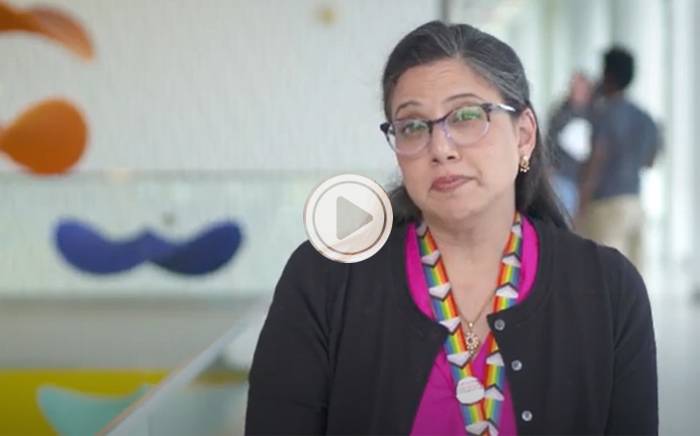 The Professional Practice Model at St. Louis Children’s Hospital is an image that describes the values, beliefs, and systems for nursing practice. The model was revised in 2024 to become an interprofessional model in alignment with a newly introduced Professional Governance structure. This model reflects the environment in which clinicians, including nurses, work every day, across all practice settings.
The Professional Practice Model at St. Louis Children’s Hospital is an image that describes the values, beliefs, and systems for nursing practice. The model was revised in 2024 to become an interprofessional model in alignment with a newly introduced Professional Governance structure. This model reflects the environment in which clinicians, including nurses, work every day, across all practice settings.
At the top of the model within the arch, the Patient, Family, and Community reflect the spectrum and continuity of care provided to patients and families who receive care at St. Louis Children’s Hospital either in the hospital, by accessing ambulatory services, or through community outreach and services.
The children holding the balloons represent the BJC Healthcare Values of compassion, respect, excellence, safety, and teamwork.
Patient and Family Centered Equitable Care is the philosophy from which St. Louis Children’s Hospital developed a framework for care delivery. It is an approach that promotes partnerships with the patients and families to achieve optimal health outcomes in a way that ensures all patients, regardless of race, ethnicity, and primary language spoken receive exceptional patient and family-centered care.
Research, Evidence-Based Practice, and Innovation represents the scientific aspect of nursing and the commitment to advancing nursing practice at St. Louis Children's Hospital. Without the scientific base, there would not be improvement. Research is the generation of new knowledge through scientific inquiry. Evidence-Based Practice (EBP) is the thoughtful use of scientific knowledge encompassing both external research and internal data combined with clinical expertise and patient preferences in the delivery of nursing care. At St. Louis Children’s Hospital, EBP is the standard of care and the organization strives to create a culture that sustains the use of evidence for direct care decision-making. Innovation is using a novel approach to solve an existing problem in a different way.
Professional Governance is structure comprised of five interprofessional working councils that promote collaboration, decision-making, autonomy, and accountability in our practice environment. The councils, made up of representatives across many disciplines, including nursing, is led by clinical team members, and empowers staff to work together to advance professional and evidence-based care, staff engagement and professional growth, and patient, family and workforce experience.
Accountability refers to being “answerable” to yourself and others for your choices, decisions and actions when compared to the America Nurses Association (ANA) Code of Ethics for Nurses with Interpretive Statements (2015, p. 41). Nurses must be accountable for their own knowledge and skills as they provide patient care (Farquharson, 2004).
Recognition represents how nurses at St. Louis Children’s Hospital are rewarded and recognized for their outstanding achievements and contributions to nursing practice.
Professional Development is a phase of lifelong learning where nurses engage to develop and maintain competence, enhance nursing practice, and support achievement of their career goals.
References
American Nurses Association. (2015). Code of ethics for nurses with interpretive statements. In Nursesbooks.org.
Farquharson, J. M. (2004). Liability of the nurse manager. In T. D. Aiken (Ed.), Legal, ethical, and political issues in nursing (2nd ed., pp. 311-336). F.A. Davis Company.









